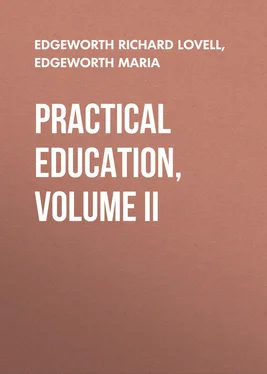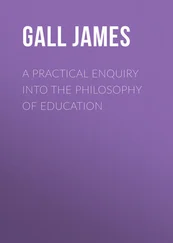Richard Edgeworth - Practical Education, Volume II
Здесь есть возможность читать онлайн «Richard Edgeworth - Practical Education, Volume II» — ознакомительный отрывок электронной книги совершенно бесплатно, а после прочтения отрывка купить полную версию. В некоторых случаях можно слушать аудио, скачать через торрент в формате fb2 и присутствует краткое содержание. Жанр: Прочая научная литература, foreign_edu, foreign_antique, foreign_prose, на английском языке. Описание произведения, (предисловие) а так же отзывы посетителей доступны на портале библиотеки ЛибКат.
- Название:Practical Education, Volume II
- Автор:
- Жанр:
- Год:неизвестен
- ISBN:нет данных
- Рейтинг книги:3 / 5. Голосов: 1
-
Избранное:Добавить в избранное
- Отзывы:
-
Ваша оценка:
- 60
- 1
- 2
- 3
- 4
- 5
Practical Education, Volume II: краткое содержание, описание и аннотация
Предлагаем к чтению аннотацию, описание, краткое содержание или предисловие (зависит от того, что написал сам автор книги «Practical Education, Volume II»). Если вы не нашли необходимую информацию о книге — напишите в комментариях, мы постараемся отыскать её.
Practical Education, Volume II — читать онлайн ознакомительный отрывок
Ниже представлен текст книги, разбитый по страницам. Система сохранения места последней прочитанной страницы, позволяет с удобством читать онлайн бесплатно книгу «Practical Education, Volume II», без необходимости каждый раз заново искать на чём Вы остановились. Поставьте закладку, и сможете в любой момент перейти на страницу, на которой закончили чтение.
Интервал:
Закладка:
A few months ago, Mr. – gave his little daughter H – , a child of five years old, her first lesson in English grammar; but no alarming book of grammar was produced upon the occasion, nor did the father put on an unpropitious gravity of countenance. He explained to the smiling child the nature of a verb, a pronoun, and a substantive.
Then he spoke a short familiar sentence, and asked H – , to try if she could find out which word in it was a verb, which a pronoun, and which a substantive. The little girl found them all out most successfully, and formed no painful associations with her first grammatical lesson. But though our pupil may easily understand, he will easily forget our first explanations; but provided he understands them at the moment, we should pardon his forgetfulness, and we should patiently repeat the same exercise several days successively; a few minutes at each lesson will be sufficient, and the simplest sentences, such as children speak themselves, will be the best examples. Mr. – , after having talked four or five times, for a few minutes at a time, with his son S – , when S – was between five and six years old, about grammar, asked him if he knew what a pronoun meant? The boy answered, "A word that is said instead of a substantive." As these words might have been merely remembered by rote, the father questioned his pupil further, and asked him to name any pronoun that he recollected. S – immediately said, " I a pronoun." "Name another," said his father. The boy answered after some pause, as if he doubted whether it was or was not a pronoun, A . Now it would have been very imprudent to have made a sudden exclamation at the child's mistake. The father, without showing any surprise, gently answered, "No, my dear, a does not stand in the place of any substantive. We say a man , but the word a does not mean a man , when it is said by itself – Does it?"
S – . No.
Father. Then try if you can find out a word that does.
S – . He, and Sir .
Sir does stand, in conversation, in the place of a man, or gentleman; therefore the boy, even by this mistake, showed that he had formed, from the definition that had been given to him, a general idea of the nature of a pronoun, and at all events he exercised his understanding upon the affair, which is the principal point we ought to have in view.
An interjection is a part of speech familiar to children. Mr. Horne Tooke is bitter in his contempt for it, and will scarcely admit it into civilized company. "The brutish inarticulate interjection, which has nothing to do with speech, and is only the miserable refuge of the speechless, has been permitted to usurp a place amongst words, &c." – "The neighing of a horse, the lowing of a cow, the barking of a dog, the purring of a cat; sneezing, coughing, groaning, shrieking, and every other involuntary convulsion with oral sound, have almost as good a title to be called parts of speech, as interjections have."
Mr. Horne Tooke would have been pleased with the sagacity of a child of five years old (S – ) who called laughing an interjection. Mr. – gave S – a slight pinch, in order to produce "an involuntary convulsion with oral sound." And when the interjection Oh! was uttered by the boy, he was told by his father, that the word was an interjection; and, that "any word or noise, that expresses a sudden feeling of the mind, may be called an interjection." S – immediately said, "is laughing an interjection, then?" We hope that the candid reader will not imagine, that we produce these sayings of children of four or five years old, without some sense of the danger of ridicule; but we wish to give some idea of the sort of simple answers which children are likely to make in their first grammatical lessons. If too much is expected from them, the disappointment, which must be quickly felt, and will be quickly shown by the preceptor, will discourage the pupil. We must repeat, that the first steps should be frequently retraced: a child should be for some weeks accustomed to distinguish an active verb, and its agent, or nominative case, from every other word in a sentence, before we attempt to advance. The objects of actions are the next class of words that should be selected.
The fanciful, or at least what appears to the moderns fanciful, arrangement of the cases amongst grammarians, may be dispensed with for the present. The idea, that the nominative is a direct, upright case , and that the genitive declines with the smallest obliquity from it; the dative, accusative, and ablative, falling further and further from the perpendicularity of speech, is a species of metaphysics not very edifying to a child. Into what absurdity men of abilities may be led by the desire of explaining what they do not sufficiently understand, is fully exemplified in other sciences as well as grammar.
The discoveries made by the author of Epea Pteroenta, show the difference between a vain attempt to substitute analogy and rhetoric in the place of demonstration and common sense. When a child has been patiently taught in conversation to analyze what he says, he will take great pleasure in the exercise of his new talent; he will soon discover, that the cause of the action does not always come before the verb in a sentence, that sometimes it follows the verb. "John beats Thomas," and "Thomas is beaten by John," he will perceive mean the same thing; he may, with very little difficulty, be taught the difference between a verb active and a verb passive; that one brings first before the mind the person or thing which performs the action, and the other represents in the first place the person or thing upon whom the action is performed. A child of moderate capacity, after he has been familiarized to this general idea of a verb active and passive, and after he has been taught the names of the cases, will probably, without much difficulty, discover that the nominative case to a passive verb becomes the accusative case to a verb active. "School-masters are plagued by boys." A child sees plainly, that school-masters are the persons upon whom the action of plaguing is performed, and he will convert the sentence readily into "boys plague school-masters."
We need not, however, be in any hurry to teach our pupil the names of the cases; technical grammar may be easily learned, after a general idea of rational grammar has been obtained. For instance, the verb means only the word , or the principal word in a sentence; a child can easily learn this after he has learnt what is meant by a sentence; but it would be extremely difficult to make him comprehend it before he could distinguish a verb from a noun, and before he had any idea of the structure of a common sentence. From easy, we should proceed to more complicated, sentences. The grammatical construction of the following lines, for example, may not be immediately apparent to a child:
"What modes of sight between each vast extreme,
The mole's dim curtain, and the lynx's beam;
Of smell the headlong lioness between,
And hound sagacious on the tainted green."
" Of Smell. " A girl of ten years old (C – ) was asked if she could tell what substantive the word " of " relates to; she readily answered, " modes ." C – had learned a general idea of grammar in conversation, in the manner which we have described. It is asserted from experience, that this method of instructing children in grammar by conversation, is not only practicable, but perfectly easy, and that the minds of children are adapted to this species of knowledge. During life, we learn with eagerness whatever is congenial with our present pursuits, and the acquisition of language is one of the most earnest occupations of childhood. After distinct and ready knowledge of the verb and nominative case has been acquired, the pupil should be taught to distinguish the object of an action, or, in other words, the objective or accusative case. He should be exercised in this, as in the former lessons, repeatedly, until it becomes perfectly familiar; and he should be encouraged to converse about these lessons, and to make his own observations concerning grammar, without fear of the preceptor's peremptory frown, or positive reference to " his rules ." A child of five years old, was asked what the word " Here! " meant; he answered, "It means to give a thing."
Читать дальшеИнтервал:
Закладка:
Похожие книги на «Practical Education, Volume II»
Представляем Вашему вниманию похожие книги на «Practical Education, Volume II» списком для выбора. Мы отобрали схожую по названию и смыслу литературу в надежде предоставить читателям больше вариантов отыскать новые, интересные, ещё непрочитанные произведения.
Обсуждение, отзывы о книге «Practical Education, Volume II» и просто собственные мнения читателей. Оставьте ваши комментарии, напишите, что Вы думаете о произведении, его смысле или главных героях. Укажите что конкретно понравилось, а что нет, и почему Вы так считаете.












